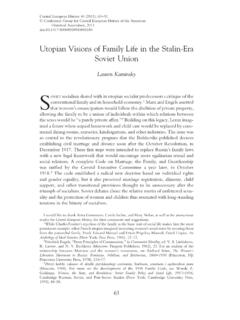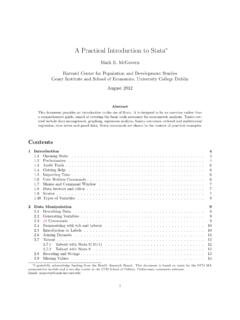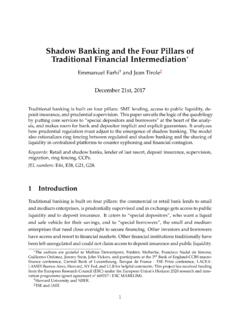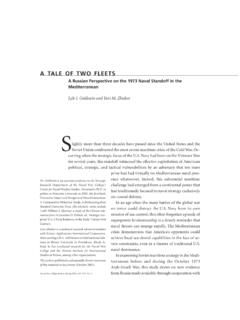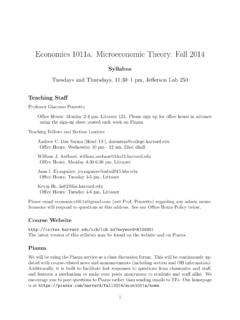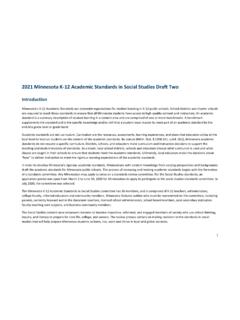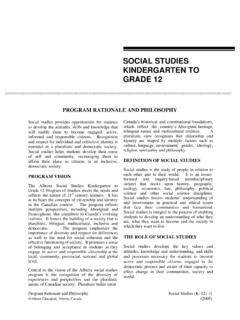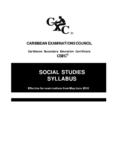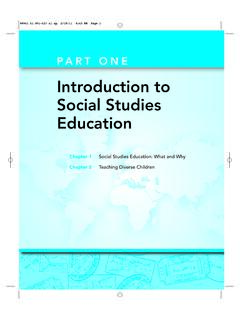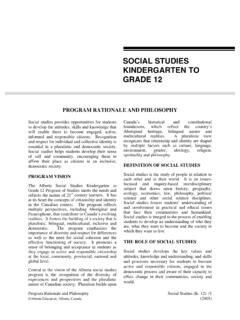Transcription of Making Sense of Culture - Harvard University
1 SO40-FrontMatter ARI 8 July 2014 6:42 Annu. Rev. Sociol. :1-30. Downloaded from Professor Orlando Patterson on 09/01/14. For personal use ARI 1 July 2014 9:14 Making Sense of CultureOrlando PattersonDepartment of Sociology, Harvard University , Cambridge, Massachusetts 02138;email: Rev. Sociol. 2014. 40:1 30 First published online as a Review in Advance onMay 2, 2014 TheAnnual Review of Sociologyis online article s 2014 by Annual rights reservedKeywordsbeliefs, cognition, Culture , meaning, norms, pragmatics, schema, valuesAbstractI present a brief review of problems in the sociological study of Culture ,followed by an integrated, interdisciplinary view of Culture that eschewsextreme contextualism and other orthodoxies. Culture is defined as theconjugate product of two reciprocal, componential processes. The firstis a dynamically stable process of collectively made, reproduced, andunevenly shared knowledge structures that are informational and mean-ingful, internally embodied, and externally represented and that providepredictability, coordination equilibria, continuity, and meaning in hu-man actions and interactions.
2 The second is a pragmatic component ofculture that grounds the first, and it has its own rules of usage and apragmatically derived structure of practical knowledge. I also offer anaccount of change and draw on knowledge activation theory in explor-ing the microdynamics of cultural practice and propose the conceptof cultural configuration as a better way of studying cultural practicein highly heterogeneous modern societies where people shift betweenmultiple, overlapping Rev. Sociol. :1-30. Downloaded from Professor Orlando Patterson on 09/01/14. For personal use ARI 1 July 2014 9:14 Power, power everywhere,And how the signs do shrink,Power, power everywhere,And nothing else to think. Marshall Sahlins (2002), Waiting forFoucault, StillO how they cling and wrangle, some who claimFor preacher and monk the honored name!For, quarreling, each to his view they folk see only one side of a thing.
3 Parable of the Blind Men and the ElephantUdanam (transl. Woodward, 1948,p. 83)PART 1: INTRODUCTIONThe Unsettled State ofCultural SociologyThe sociological study of Culture , like itsanthropological counterpart, is riddled withacademic contention: tired and torturedconceptual contestations about the natureof Culture itself (Sewell 2005, pp. 152 74;Sangren 2000, pp. 20 44; cf. Patterson 2007);debilitating uncertainty about the nature andcentrality of meaning (Wuthnow 1987, pp. 64 65); rejections of hard-won methodologicalclaims (Biernacki 2012); repeated and oftenunproductive agenda settings; sweeping dis-missals and dogmatic overreaction to the errorsor biases of previous traditions of scholarship(Swidler 1986; cf. Friedland & Mohr 2004b,pp. 13 17; King 2000); the untenable ditching,with the bathwater of the Parsonian past, offoundational concepts such as values and normsthat strike most scholars in other disciplines assimply preposterous (Hechter & Opp 2001);political oversensitivity, especially in regard torace and inequality, entailing the endless flog-ging of long dead and buried horses such as theculture of poverty thesis (Skrentny 2008); thedogmatic rejection of causal explanations at oneextreme (Geertz 1973, p.)
4 14) and, at the other,explanatory evasiveness more generally (withthe notable exception of some studies in socialmovement and economic sociology) (Levin2008, Polletta 2008) or questionable claims ofuncoupled cultural autonomy and causation(Alexander 2003, pp. 11 26; cf. Friedland &Mohr 2004b, pp. 5 11; Kaufman 2004); andoutright contradiction, when deployed, inthe causal use of Culture bad, even racist,when used to understand the poor or minoritybehavior; good, and desperately grasped, whenused to explain the racial IQ gap (Patterson2001, Serpell 2000; see also Vaisey 2010).To make matters worse, the subject is alsopolitically fraught, both within and outside theacademy, especially in our current age of iden-tity, where leaders and activists as well as schol-ars challenge each other, not only on the in-terpretation of their cultures, but also on thevery definition and meaning of Culture itself(Wright 1998).
5 Oversensitivity to identity pol-itics and claims is another reason for one of themain failings of current studies of Culture , men-tionedabove:theflightofthevastmajori tyfromcausalityorcomparativegeneralizati onsforfearof being labeled racists or essentialists. Thus,even though cultural sociologists (fearful of so-cial irrelevance) have recently begun to tiptoetheir way back to a consideration of inequality,poverty, and minority problems (see, for exam-ple, Charles 2008, Small et al. 2010), it is stillde rigueurto eschew robust causal explanations(Vaisey 2010), except for those who huddle be-hind the Gallic shield of Bourdieu, often at thecost of undercutting critical components of histheory (Stevens 2008, p. 104); instead, a softand nebulous neo-Weberianverstehenreigns,in which the cultural sociologist is reduced tolittle more than a mouthpiece for his or hersubjects understanding of their Culture and be-havior.
6 And these understandings are plaguedby what Bourdieu calls the discourse of fa-miliarity, which often leaves unsaid preciselywhat is so important that it is taken for granted(Bourdieu 1977, p. 18) or is saturated with thevery essentialism that these cultural sociologistscondemn in each serious problem that besets socio-logical studies of Culture is the chronic fallacy ofthe blind people and the elephant, in which eachinsists that the part of the elephant he or sheis touching constitutes its entirety. The main2 PattersonAnnu. Rev. Sociol. :1-30. Downloaded from Professor Orlando Patterson on 09/01/14. For personal use ARI 1 July 2014 9:14reason for this error is the tendency by manyof the leading practitioners to redefine the fieldand carve out new agendas (for a laudable re-cent exception, see Binder et al. 2008, particu-larly pp. 6 14). Sadly, what Wuthnow observedin the late 1980s remains largely true: Replica-tions fail to replicate; refutations fail to refute;replies fail to convince; and the dismissals typi-cally dismiss too much or too little (Wuthnow1987, p.)
7 7). The result is a persistent lack of con-sensus or rigor in defining Culture , an issue that,as Small & Newman (2001) noted, has tor-mented both sociologists and anthropologistsfor decades, and there is no reason to believewe will ever arrive at a consensus (p. 35). Notonly has this undermined the cumulative pro-cess that is essential for progress in any arenaof study, but it has also undercut the reputationof cultural studies generally. Although we arerepeatedly told that there has been a culturalturn in sociology and related disciplines go-ing back to the 1980s (Bonnell & Hunt 1999,Friedland & Mohr 2004b, Steinmetz 1999; 2000), and indeed, the Culture sectionof the American Sociological Association is nowone of the largest, most noncultural sociologistsare still wary of Culture and either shun any ex-ploration of its role in their explanatory modelsor go out of their way to point out its lack ofimportance or further problem is the baneful isolation ofcultural sociologists from major developmentsin the study of Culture in the nonhistorical socialsciences.
8 There have been significant borrow-ings from cognitive psychology thanks to thepioneering work of Cicourel (1973), DiMaggio(1997), Cerulo (2010b), Zerubavel (1997),Benford & Snow (2000), and more recentscholars [see the special issue ofPoetics(Cerulo2010a)]. However, these infusions have comefrom cognitive scientists who, notoriously, arenot particularly interested in Culture (Hutchins1995, pp. 353 54). The parochialism to which Irefer is the shocking neglect of work on culturein other disciplines such as anthropology (withthe notable exception of Clifford Geertz),psychological and cross-cultural anthropology,evolutionary cultural studies , and even socialpsychology except for the rump still in thediscipline. The frustrating part of all this isthat an abundance of first-rate work on cultureamong sociologists resides in the particularsections of the elephant they embrace (seethe excellent literature reviews in Binder et ).
9 This is especially true of the agendasetters, once they get down to the empiricsof their craft. Thus, Jeffrey Alexander (2003,chapters 2 4; 2012) when not pushing his strong program, has written superb studieson the Holocaust and the general problemsof evil and trauma. Swidler s (1986) widelycited programmatic paper on Culture has gonefurther than most in downplaying the causalsignificance of cultural knowledge structures,values, and norms in social life (Schudson1989, p. 156), even though, as Vaisey (2009,p. 1687) points out, it rests on the flawedcognitive premise that moral judgment wouldhave to operate through conscious thought tobe causally efficacious (see also Vaisey 2008;for a more conciliatory critique of Swidler,see Lizardo & Strand 2010). Nonetheless, hernow classic works with Bellah on Americanculture are arguably among the most powerfuldemonstrations of the role of values, ideology,and moral order in modern society (Bellah et ), and her recent study of chieftaincy inrural Malawi is a full-throttle, volte-face returnto the centrality of norms, values, and stablecultural knowledge structures in explainingsocial processes (Swidler 2013).
10 Similarly,Lamont s energetic promotion of the ideaof boundaries as central to cultural analysisbegan as a worthwhile effort to synthesize andapply previous work on the subject (Lamont &Fournier 1993). Unfortunately, the relative sig-nificance of the concept has subsequently beengreatly exaggerated and its emphasis misplacedfrom that of Barth s (1969) definitive (thoughincreasingly neglected) statement as well asthose of previous and later scholars (Bourdieu1984, 1989; Douglas 1966; Durkheim 1912[2008]; Firth 1973; Turner 1969). There is farmore to Culture and interaction than incessantboundary work. What Fiske (2010, p. 969)wrote of hierarchical differences holds Making Sense of Culture 3 Annu. Rev. Sociol. :1-30. Downloaded from Professor Orlando Patterson on 09/01/14. For personal use ARI 1 July 2014 9:14all boundaries, that they are not the onlygame going in social encounters.
